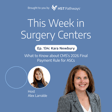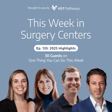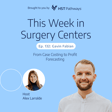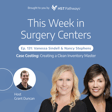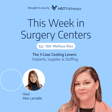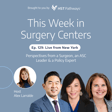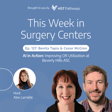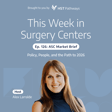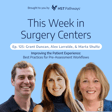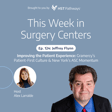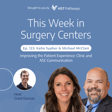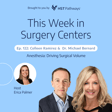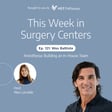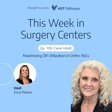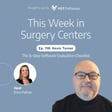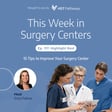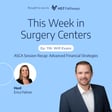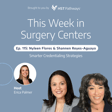Introduction to ASC Industry Podcast
00:00:01
Speaker
Welcome to This Week in Surgery Centers. If you're in the ASC industry, then you're in the right place. Every week, we'll start the episode off by sharing an interesting conversation we had with our featured guests, and then we'll close the episode by recapping the latest news impacting surgery centers. We're excited to share with you what we have, so let's get started and see what the industry's been up to.
00:00:27
Speaker
Hi, everyone. Here's what you can expect on today's episode.
Building ASC Management Groups
00:00:32
Speaker
John Brock is the co-founder, president, and COO of SurgeNet Health Partners. And he joins us this week to talk through the blueprint for building an ASC management group. So John takes us through the whole process, starting with market analysis and securing funding, all the way through how to operate at peak efficiency, managing metrics, emerging trends to consider, everything in between.
Current Issues: Orthopedics, Colonoscopy, AI
00:00:55
Speaker
And our news recap, we'll cover the most controversial issues in orthopedics right now, the growing colonoscopy boom, Hartford HealthCare's new center for AI innovation, and of course, and the new segment with a positive story about hospital proposals. Hope everyone enjoys the episode and here's what's going on this week in surgery centers.
Founding of SurgeNet Health Partners
00:01:20
Speaker
John, welcome to the show. Thanks, Nick. I'm pleased to be here.
00:01:25
Speaker
Johnny founded Surgeonette Health Partners a couple of years ago. Can you tell us a little bit about the founding story and why you decided to start Surgeonette?
Business Plans and Funding Strategies
00:01:35
Speaker
Absolutely. And to be clear, I co-founded my business partner and co-founder Chase Neal. We had been talking about doing this for several years. It's interesting. We've known each other for a long time, almost 20 years.
00:01:50
Speaker
And my background was in hospital operations, but in 2005, I got into the ASC world and was running this really large multi-specialty center for Symbion later to become surgery partners in Texas. And Chase, who's got a development background to my operations background, which is a good fit, he came in.
00:02:13
Speaker
and syndicated four new physician investors into my center. And that's how we got to know each other and have maintained a strong personal.
00:02:22
Speaker
relationship over the years and he called me and said, what do you think about us doing this? And I said, you know what? I think it's a great idea. You know, for years we've been working for other people and there's something to be said for doing it, you know, working for yourself and doing it yourself. And we are chasing eye and.
Flexible Management Styles in ASCs
00:02:45
Speaker
other key initial hires are very experienced with most of the larger ASC management companies. So we learned a lot there and that includes how to do things as well as how not to do things. So we feel like that, that positioned as well to take this on and really rolled it out in January of 2022. And here we are.
SurgeNet's Acquisition and Development Strategy
00:03:08
Speaker
That's fantastic.
00:03:10
Speaker
Thanks for walking us through that story. As you and Chase took this from idea and conversation to, hey, now it's getting more serious, did you start to build out a business plan or start to document anything in a formalized fashion?
00:03:27
Speaker
We did and Nick, a lot of that came through the funding process. You know, and when we began this in the first quarter of 22, we immediately developed a relationship with a investment banker in Nashville. His name is Jason Denenburg with Wavecrest Securities. And we felt like Jason could be of tremendous assistance to us and taking us through the process of working with.
00:03:55
Speaker
different private equity firms and working toward developing a relationship and getting funded. And during that time, that's when the business plan was created. A lot of, I guess you would say was in presentation form, but it was kind of a two birds with one stone thing.
00:04:13
Speaker
And then in December of 2022, we actually formalized in a working relationship with three different firms that are participants at three different levels. Fulcrum Equity Partners out of Atlanta was first and foremost, followed by Levitt Equity Partners out of Salt Lake and then Harpeth Capital out of Nashville. And I guess as they say, the rest is history.
Efficiency and Revenue Cycle Management
00:04:40
Speaker
Got it. And what attracted those investment partners into investing with you? You know, how did you guys kind of articulate the story and the opportunity to them?
00:04:52
Speaker
Well, I think that's a terrific question that probably they'd be in a better position to answer than I would. But what I will tell you, I think there were several things. I think it was chasing my personalities. I think they felt like we were the kind of people they wanted to work with, which is obviously a positive.
00:05:12
Speaker
I think they loved how we compliment each other. Chase being an M&A development guy, me being an operator, I think they felt like we had all the bases covered as a result of that. I think that was attractive to them. I think they really liked the business model, which with us, it's a little different
00:05:35
Speaker
than a lot of the other ASC companies. We're willing to go in and take a minority equity position in an acquired center where most of the others are not.
KPIs and Standardization in ASC Management
00:05:45
Speaker
They go in at a minimum of 51%, but one of the things that we do is we can go in at 51% depending on what the physician group wants, but we can also go in at 30.
00:05:57
Speaker
And the beauty of that for the docs is that they are able to divest some, get a bite of the apple then. And then ultimately when the company is probably sold to a larger aggregator, they would get a second bite at the apple by divesting to get, to allow the new acquisition company to get up to 51%. So I think that was very attractive to them as well, that we were willing to do things a little differently.
00:06:26
Speaker
than our counterparts in the industry do it. Got it. And John, when you think about management companies in the ASC industry, just in general, how do you articulate the key sources of value that management companies can bring to individual facilities?
Trends in Outpatient Surgery and Challenges
00:06:48
Speaker
Another great question.
00:06:49
Speaker
You know, it's interesting. Our major target type center is a wholly owned center where it's wholly owned by physicians, where it's not obviously tied to a management company now because chances are if they were, they probably wouldn't be looking to make a move. And
00:07:07
Speaker
You know, what we found a lot of these centers have, some of them have done just amazingly well, but what we found is a lot of them, one, they don't know what they don't know. That's something there. And two, I think the group of physicians in any given case, maybe has taken their center as far as they can take it.
00:07:30
Speaker
And when I say this, I'm not talking about that they're oblivious to AAAHC or CMS regs or things like that. But in terms of, I think, growing the center and expense management, and I'm not talking about slashing expenses, I'm talking about being smart.
00:07:49
Speaker
That's where you can, I think make a major impact along with revenue cycle and certainly some standardization. And in this particular case, you know, an example would be getting these centers on the HST platform is a good thing that maybe they weren't aware of in the past of a company like HST or whatever. And there's just a lot of experience and knowledge that I think we bring to the table that they really don't have.
00:08:17
Speaker
Yep. And that makes sense. And as you think about your firm, SurgeNet, in your future growth,
Enhancing Surgery Center Operations
00:08:23
Speaker
you mentioned Chase, your partner's strong on the development side. Are you planning on developing facilities yourselves? Are you planning on acquiring facilities, you know, like you've done the last couple of years or a mix of both? A mix of both, actually. You know, the first two on our platform were both acquisitions, existing centers, and certainly that's where we kind of
00:08:44
Speaker
look first, I would say, which I'd say most companies do that. Most of our peer companies do that as well. But we're not opposed to de novo centers. We like those opportunities as well. We honestly like to do more of them now. So they would have a chance to mature with us as the company matures. But yeah, I mean, we're certainly open to either one. There's a certain beauty to creating something from scratch.
00:09:13
Speaker
And, you know, you feel like, okay, the center is laid out perfectly and you're doing everything perfectly and which you're not, but you, at least you kind of go into it thinking you are, but yeah, we're open to either one. Obviously with the existing centers, you know, they're already up and going and there's a multitude of benefits to that, especially financial.
Healthcare Trends: Orthopedics, Colonoscopy, AI
00:09:37
Speaker
Yep. Yep. And that makes sense. And on the acquisition side, is that a big part of how you guys are spending your time is looking at potential acquisitions and individual facilities to partner with?
00:09:49
Speaker
Yes. You know, we have a couple additional operators on board. They are spending a lot of their time with the two centers that we have, but Chase and I together, along with an additional development person we have, we look closely at opportunities. And one of our ops people participates in that as well, based on knowledge and background and whatnot. But yeah, that's the big thing right now because we're in growth mode.
00:10:19
Speaker
And so to answer your question, yes, that's what we're spending the lion's share of our time on right now while simultaneously trying to oversee the operation of our two existing centers. Sure. And on that note, on the two existing centers and for future centers, how would you describe
00:10:40
Speaker
your guys's management style or approach or engagement model with the facilities. Do you try to be pretty hands-on? Do you want the facilities to be more autonomous and run on their own? What end of the spectrum would you say you guys are on from a philosophy? Well, in all honesty, Nick, I think it depends on the facility and different facilities have different needs. Obviously, anybody that
00:11:08
Speaker
has spending time in leadership and you want to bring people along where.
00:11:14
Speaker
they become good at their job. And if there's situations where we need to do that, we will do that. We will help, you know, mentor and lead and try to get people where they need to be or try to get operations where they need to be a little bit. In other circumstances, I think we're going to find that there are situations that they're doing really well and that that's not really the same priority for us as
00:11:40
Speaker
some of the others. So I guess to answer your question, I'd say we're probably in the middle, but it's center dependent. And I think all of us, all of our operators, we kind of lead by example, we lead based on our extensive experience and operating ASCs, which is a differentiator for us. You know, I ran a large one
00:12:02
Speaker
One of our operations people has run four. Our chief clinical officer ran one for 20 years and is also a AAAHC surveyor and on AAAHC's board. So you're talking about a significant amount of experience and depth of knowledge that we will be bringing to the table, to the centers. And I think it also includes leadership style.
00:12:28
Speaker
And I will say this too, as we add additional operations people, they will be people that have run surgery centers and feel like that's a differentiator for us. Yeah. It sounds like fantastic expertise and background. And my sense is that the groups that choose to partner with you will likely do that in part because they see the benefits of tapping into that, right? Certainly hope so. Yes.
00:12:57
Speaker
Great. On that same vein, you mentioned, hey, we've got a flexible approach based on the facility. Are there any areas where you think that standardization is important across the different centers that you're going to manage, maybe on things like reporting or KPIs? Any benefits to standardization? Oh, absolutely.
00:13:17
Speaker
And KPIs is a good example of where you want to standardize things. I mean, it gives you a great opportunity to look at centers side by side based on those KPIs. Now you have different things like service lines and volume and what that kind of changed that.
00:13:34
Speaker
But, you know, all ASC administrators look at certain KPIs and anything from net revenue per case to staffing costs per case, to medical supplies costs per case, to infection, right. You know, you name it.
00:13:50
Speaker
And all of those things are, they're critical in every center, but things like an operating platform, we feel like it makes sense. You could always look at things too, like satisfaction survey processes, obviously a GPO, different things like that. It makes significant sense to do it when you can. And when it doesn't cause a facility to lose its individuality and what makes it great.
00:14:18
Speaker
And you mentioned, you know, the KPIs. Do you guys try to provide benchmarking on, hey, what could great look like in terms of these individual metrics or KPIs? Oh yeah, absolutely. And like I said, a lot of them, it depends on the service lines and it depends on the case volume and various things like that. But yeah, we absolutely do benchmarking for the benefit of the people in the centers. And we found in,
00:14:45
Speaker
you know, some of these wholly owned physician centers, that's not necessarily something they pay attention to in the same way that we do. Obviously the clinical things there, they expect to have a infection rate that's, you know, one 10th of what a hospital is or whatever. But in terms of formally working through that and looking at it on a regular basis in terms of how to operate, I think in a lot of cases that's new to them.
00:15:14
Speaker
Sure. Yeah, that definitely seems like a value add in terms of, it can be easy, I think for individual facilities to sometimes focus within the four walls of the facility, kind of providing that broader perspective can certainly add value. Shifting gears on you to emerging trends. Are there any emerging trends in healthcare that you see that you expect will impact management companies, maybe even the strategy for Surgeonette going forward? Well, you know,
00:15:43
Speaker
There are a couple of things and I saw something in Becker's today where they were talking about Medicare continues to push patients to an outpatient setting and a few years back you could only get your knee replaced in an ASC if you were under 65. Now they're doing it for Medicare patients so they're starting to do that more and more and the private payers are following suit
00:16:07
Speaker
for CMS. So that's a tremendous benefit for ASCs. And I think, you know, that continues to be a trend and it will continue to lead to more patients for ASCs. I think CMS has now realized the ASC is a more cost effective operating model for them. And so that is, and frankly, probably better outcomes. So that's a key thing on the flip side,
00:16:35
Speaker
you know, and not to be a parrot of everything that we always see just about every day, but anesthesia is a major issue, not just for ASCs, but for healthcare. And from a cost perspective in terms of providers to the availability of them, it's become, I don't know if I'd go as far as use the word crisis, but probably not that far removed from kind of a crisis situation. Right.
00:17:04
Speaker
Those are a couple of good ones. Okay. Final question for you here, John. We do this every week with our guests. What's one thing our listeners can do this week to improve their surgery centers? Listen to spend time with your constituents. You know, assuming your listeners, maybe your administrators or whatnot, spend time with your docs.
00:17:24
Speaker
Visit with them, get into work early when maybe every room is full and catch these guys when they finish before they go to the office. Spend time with your staff, you know.
00:17:36
Speaker
Go sit down and pack you and chat with the nurses or go to materials and chat with those staff and pick a patient or two to go visit with before in pre-op and introduce yourself and say hi and tell them you're glad that they're there and tell them you're going to take good care of them and then how much it means to you that they're there. Yeah, that's a pretty easy one in terms of what I think is critical for the relationship piece of operating the center.
00:18:06
Speaker
Fantastic. John, thanks so much for joining us this week. Nick, my pleasure. I've enjoyed it thoroughly. As always, it has been a busy week in healthcare, so let's jump right in.
00:18:21
Speaker
Becker's ASC released a story highlighting the most controversial issues in orthopedics, according to three leaders in the ortho space. So Steven Barnett is the chief medical officer at Hogue Orthopedic Institute, and he shared that one nationally overarching issue is opioid use.
00:18:39
Speaker
So Steven said, and this is a direct quote, after studying the pain medication use with fellow orthopedic surgeons, pain management, and anesthesia specialists, the hospital instituted a new safe medication stewardship program that provides safe medication disposal kits at the bedside for all patients who are prescribed opioids and muscle relaxers.
00:19:01
Speaker
We felt an obligation to our patients and their families to deal with this issue upfront, providing education and tools to safely dispose of unused medications. So obviously opioid use has been a huge issue in this country for a while. We see it on the, in the surgery side as well. You know, there's an obligation there to make sure we're educating patients and only prescribing or administering what's necessary. So that was from Steven Barnett from Hogue Orthopedic Institute.
00:19:30
Speaker
And then Sarah Holman is the director of neurosurgery at Deaconess Health System. And she shared that the most controversial issue in her area right now is around inpatient versus outpatient care and trying to determine the optimal location to have surgery. From her perspective, the location doesn't matter.
00:19:50
Speaker
as much as the program itself does, explaining that managing patient expectations and ensuring they understand the process is the biggest key to success. And we've talked about that a ton, right? The movement from the migration of inpatient procedures being done in outpatient. So I'm sure that, you know, a ton of orthopedic surgeons and spine too are feeling that.
00:20:12
Speaker
And lastly, Felix Savoie is the professor and chair of the Department of Orthopedic Surgery at Tulane University. And he shared that he believes the most controversial issue is the declining reimbursement and increasing denial of care from both Medicare Advantage plans and private insurance companies. So Dr. Savoie further explained that from his perspective, these companies put in unfair roadblocks to inappropriately deny care
00:20:41
Speaker
allowing patients to suffer and require extra time, paperwork, and personnel to get the appropriate care approved. And once approved, then they refuse to pay for half of the necessary procedures, deny post-op therapy, or set a co-pay that is so high that no one can afford to pay or attend. So this is a significant threat to our patient population and to the practice of medicine, says Dr. Sebois. So we've seen a lot of that talk as well, just all the payer issues,
00:21:11
Speaker
So it's interesting that all three of them had different perspectives. And again, the concerns were opioid use, inpatient versus outpatient, and then just general payer issues too. And hearing their perspectives, even though if they aren't new, it's definitely helpful to make sure we're staying on top of these issues and aren't missing any.
00:21:29
Speaker
So our next story comes from Outpatient Surgery Magazine, and this one I thought was really interesting. So surgery centers are feverishly trying to unlock efficiencies as they thrive to meet an unprecedented demand for colonoscopies.
00:21:44
Speaker
So there are three factors that are driving the demand. The first is that there's a backlog of patients who delayed these procedures due to the pandemic. The second is that the new recommended screening age is 45. And thanks to increasing life expectancies, there's a graying of the population, which means the average age of our population is increasing over time.
00:22:08
Speaker
So Jeanine Benoit is the ASC administrator and clinic regional manager at the Novant Health Wilmington Endoscopy Center. And she said that they have the trifecta at her location, meaning all three of those factors impact their case volume.
00:22:25
Speaker
And they are currently performing about 6,500 colonoscopies a year. So for them, maximized efficiency is really the only option to meeting this capacity challenge. And they want to see as many patients as possible, making sure to not only get them in and out quickly and profitably, but of course safely while providing the highest level of care.
00:22:46
Speaker
And for reference, their center, their endoscopy center starts performing colonoscopies each day at 6.30 AM. And then over the next nine hours or so, each of its three procedure rooms hosts 16 to 18 patients with the average colonoscopy lasting a half hour. So every minute counts.
00:23:04
Speaker
AMSURGE facilities provide care at more than 250 centers across 34 states. And they said its national network of gastroenterologists performed more than 1 million colonoscopies at its facilities in 2022 alone. And here are three tips from AMSURGE for operating at max efficiency.
00:23:26
Speaker
The first is scheduling. So they are continuously evaluating their block scheduling to accommodate more colonoscopies where they can. And then they use automated text messaging to make sure patients understand what the prep process is like. And this has helped to reduce cancellations a ton or at least receive the patient cancellation as soon as possible so then they can try to fill the spot.
00:23:50
Speaker
The second tip is scope availability. So having enough scopes available to keep a busy full schedule on time throughout the day is crucial to their efficiency. This involves not only buying more scopes when needed, but also having loners on hand and improving reprocessing times. They're also constantly negotiating with scope vendors to make sure they're on call and have loners and replacements ASAP as needed. And then the third best practice is around room turnover.
00:24:19
Speaker
So high volume GI centers closely track room turnover times to optimize the patient flow. And for their busiest centers, they might have a runner or somebody else assist in the room to get ready for the next patient. And that's their sole purpose of the day. So again, those three tips were using scheduling and improving case cancellations through automated text messages, making sure you have tons of scopes available, and then just focusing on room turnover time and metrics.
00:24:47
Speaker
So if you are experiencing an increase in colonoscopy needs, just make sure that you're constantly tracking and adjusting so that everyone is working in lockstep. All right, switching gears. Connecticut-based Hartford HealthCare has unveiled a center for AI innovation in healthcare.
00:25:05
Speaker
So president and CEO Jeffrey Flax said in a statement, as we transform healthcare, we are taking new approaches to innovation. This center is poised to unlock the full potential of AI, ensuring that every algorithm is not just intelligent, but empathetic and ethical. We are committed to pioneering safe, effective, and affordable solutions that revolutionize patient care while advancing clinicians' expertise. So the new AI center has five foundational elements.
00:25:35
Speaker
collaboration and partnerships. So they are partnering with MIT, University of Oxford, and Google Cloud. The second pillar is research and innovation, of course, conducting groundbreaking AI research centered on healthcare applications and developing algorithms for safe real world implementation.
00:25:55
Speaker
The third is trustworthiness, verifying and balancing opportunities against potential risks. The fourth is education, equipping clinical and operational colleagues with the knowledge of how to use AI in a safe and trustworthy manner. And then the fifth is just invention, testing and developing new AI-enabled products.
00:26:14
Speaker
And they're already often running so the innovation center has already embarked on many research initiatives including being able to predict covid-19 related events hospital lengths of stay patient deterioration secondary stroke events and joint replacement surgery outcomes.
00:26:32
Speaker
And then they've also been working on optimizing nurse scheduling and optimizing OR efficiency, which is a great tie into our other story about the high volume GI centers. We have to be optimizing that OR efficiency. So as always, we'll include the link in the episode notes if you want to learn more, but I think this is just the beginning for this center for AI innovation and many more to come.
00:26:57
Speaker
And to end our new segment on a positive note, when you picture your marriage proposal, do you picture the hospital? Some certainly do. So for some couples who share medical careers, the hospital, surgery center, practice, wherever they work could be considered a second home and they have so many memories there together, which of course has led to a bunch of different proposals over the years. Now, the article shares a ton of stories here, just two that I thought were fun.
00:27:25
Speaker
When emergency medicine physician Anna Darby heard a trauma patient was arriving and urgently needed to be intubated, she raced up to the rooftop helipad. As soon as the elevator doors opened, she was met with quite a different scene than expected. There were rose petals everywhere and her soon-to-be fiancé, who she met at the hospital, was on the rooftop waiting for her.
00:27:49
Speaker
And then the second two doctors were selected for a local news interview on COVID-19, except the interview was really with Good Morning America. And there was no interview at all. It was actually a proposal that took place at the hospital and on TV. And that couple had met six years prior at the hospital they were filming at.
Conclusion and Next Episode Preview
00:28:11
Speaker
I have to say, if you got engaged in a medical facility or know someone who has, please go to HST's LinkedIn page and leave a comment to let us know. I would love to hear your stories. And that news story officially wraps up this week's podcast. Thank you, as always, for spending a few minutes of your week with us. Make sure to subscribe or leave a review on whichever platform you're listening from. I hope you have a great day and we will see you again next week.

